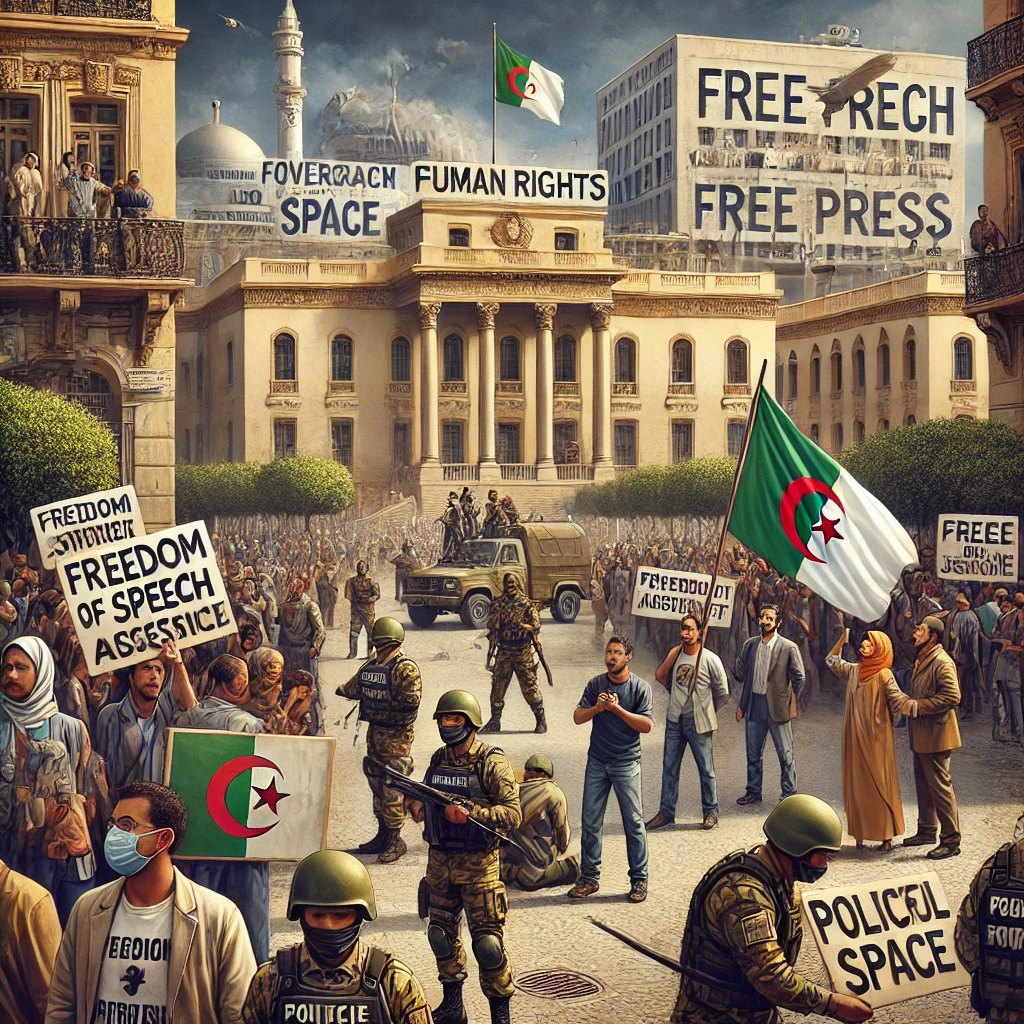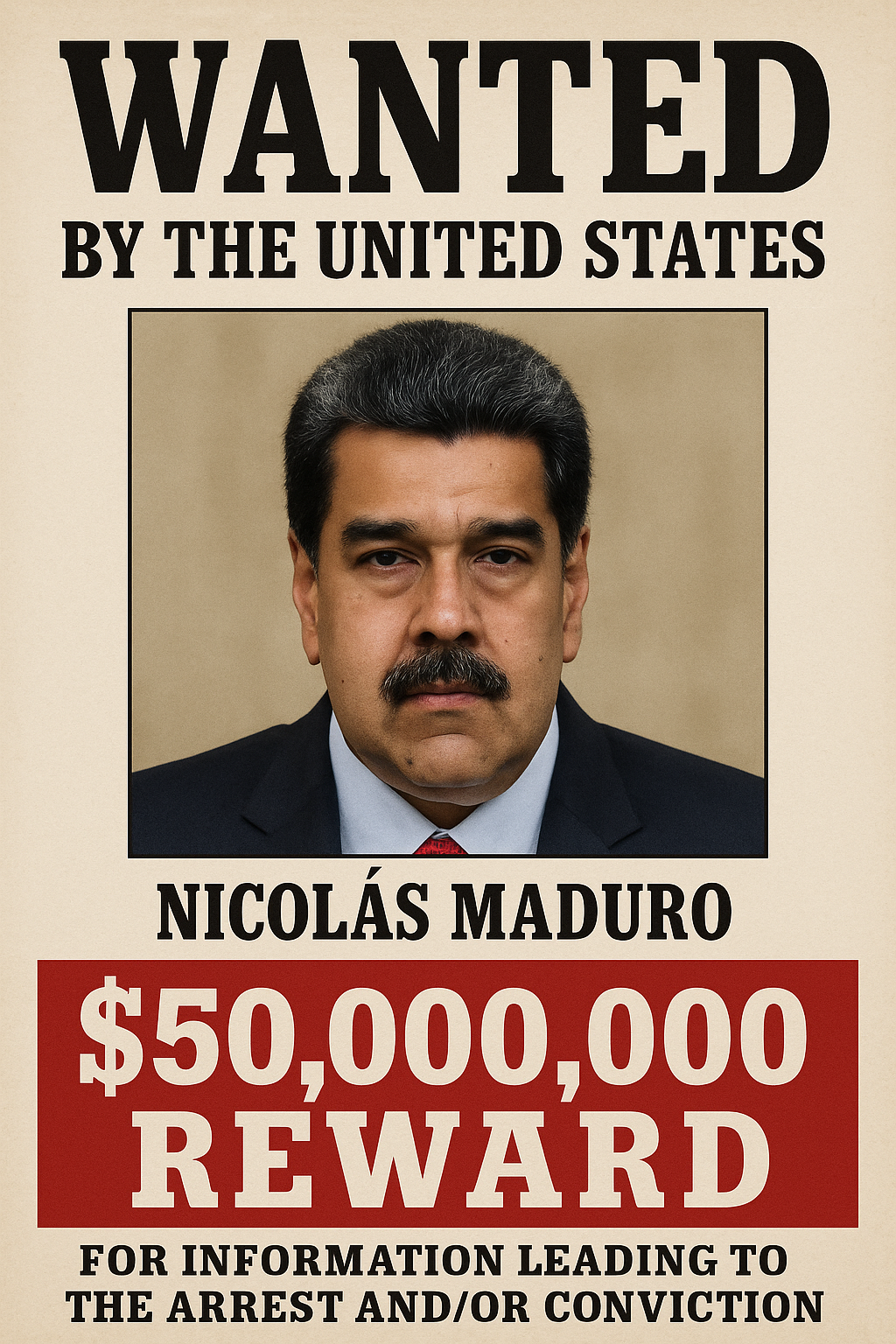Blog
Algeria’s Political Landscape in 2024: Human Rights Under Scrutiny Ahead of Elections

As Algeria navigates a pivotal year in its political trajectory, with presidential elections recently concluded in early September 2024, the international spotlight is increasingly focused on the state of human rights and civil liberties in the country. Despite being a key player in regional politics and a major energy supplier to Europe, Algeria continues to struggle with internal tensions around political freedom, civic space, and human rights. Amnesty International and other global watchdogs have raised alarm bells over ongoing government repression, casting a shadow over the legitimacy of its democratic processes.
Human Rights Concerns Ahead of Elections
Algeria has faced criticism for years regarding its handling of political dissent, especially in the aftermath of the 2019 Hirak protests, which saw millions of Algerians demanding democratic reforms and the ouster of long-time president Abdelaziz Bouteflika. While those protests achieved some immediate results, including Bouteflika’s resignation, the deep-rooted political crisis has persisted under the leadership of President Abdelmadjid Tebboune. The 2024 elections were seen as a potential turning point for the country, but the lead-up to the polls was marred by significant restrictions on free expression, peaceful assembly, and the press(Amnesty International)(Africanews).
Amnesty International has been particularly vocal about these issues, highlighting the government’s crackdown on civil liberties. According to Amnesty, Algerian authorities have introduced a series of legal amendments to the penal code that have been used to silence opposition voices. Notably, political activists have been detained on charges related to terrorism, often seen as trumped-up accusations meant to stifle dissent. Journalists, activists, and members of civil society have found themselves at odds with the government, facing arbitrary arrests and prosecutions simply for expressing views contrary to those of the ruling elite(Amnesty International).
In August 2024, authorities arrested dozens of political activists, including members of the suspended Democratic and Social Movement (MDS) and the Rally for Culture and Democracy (RCD), on vague charges linked to their activities and public statements. Activists like Yacine Mekireche, detained for social media posts critical of the government, exemplify the growing suppression of free speech. These arrests, and others like them, have created a climate of fear and intimidation, raising concerns about the fairness of the political process.
The Role of Media and Press Freedom
Press freedom in Algeria remains heavily constrained. Independent media outlets and journalists have borne the brunt of the government’s efforts to control the political narrative. Several high-profile journalists have been detained or harassed in the months leading up to the election. The detention of figures like Merzoug Touati and Mustapha Bendjama, known for their independent reporting, underscores the fragile state of media freedom in the country. These journalists have faced restrictions on their movement and have been subjected to legal pressures intended to curb their ability to report freely(Amnesty International).
According to international organizations, the media landscape in Algeria is not conducive to transparent elections. The repression of independent journalism, coupled with the government’s tight control over state-run media, has fueled accusations of voter suppression and lack of transparency in the electoral process. Observers point to a broader effort by the authorities to maintain their grip on power through the manipulation of public discourse and by limiting the flow of uncensored information.
Post-Election Challenges and International Reactions
The results of the September 2024 presidential elections, which saw Tebboune re-elected with a significant majority, have done little to ease tensions. His opponents, including Abdelali Hassani Cherif of the Movement of Society for Peace and Youcef Aouchiche of the Front of Socialist Forces, questioned the legitimacy of the vote, citing widespread allegations of electoral fraud. The Independent Electoral Authority (ANIE), which oversaw the elections, was criticized for its role in what opposition candidates and observers described as inaccuracies and ambiguities in the voting process(Africanews).
The low voter turnout—just 5.6 million out of nearly 24 million registered voters participated—further highlights the disillusionment of the Algerian public. Many citizens, particularly those who supported the Hirak movement, boycotted the election, viewing it as a sham orchestrated by the military-backed government to consolidate power. The lingering dissatisfaction with Tebboune’s administration and the continued protests against the government point to a profound political crisis that remains unresolved(Africanews).
International human rights organizations and foreign governments have expressed concern over the state of democracy in Algeria. The crackdown on dissent, coupled with reports of election manipulation, has sparked widespread criticism from the global community. Calls for the release of political prisoners and an end to the repression of civic space have intensified in the wake of the elections, but the Algerian government has shown few signs of altering its course.
The Future of Algerian Politics
As Algeria moves forward, the challenges facing its political system are vast. The government’s reliance on oil and gas revenues has long shielded it from deeper scrutiny, particularly from European countries dependent on Algerian energy exports. However, the internal demand for greater democratic accountability, driven by young people and civil society, continues to grow. If Algeria is to achieve long-term political stability, it will need to address the demands for political reform and find a way to reconcile with a population that remains deeply skeptical of the political status quo.
The international community will also play a critical role in encouraging reforms. Diplomatic pressure, combined with support for human rights advocacy within Algeria, could help create an environment where dissent is tolerated and meaningful political participation is restored. Without such changes, the risk of ongoing unrest and instability will remain high.
In conclusion, Algeria’s 2024 elections have not provided the reset that many hoped for. Instead, they have revealed the deep fractures within the country’s political system and the enduring struggle for democratic freedom. How the government responds to these challenges will shape Algeria’s political future for years to come.
Blog
Morocco Sets Sights on 70% 5G Coverage by 2030 With New License Launch

RABAT — July 26, 2025
In a landmark step toward digital transformation, Morocco’s National Telecommunications Regulatory Agency (ANRT) has officially launched the bidding process for 5G licenses, inviting national and international telecom operators to help deliver 25% population coverage by 2026 and 70% by 2030.
5G Strategy to Power FIFA World Cup and Beyond
The initiative aligns with Morocco’s preparations to co-host the 2030 FIFA World Cup and its broader Maroc Digital 2030 agenda. “This is about more than faster networks—it’s about our national future,” said Driss El Yazami, policy advisor at the Ministry of Digital Transition.
Highlights of the 5G Deployment Plan
- Initial rollouts in Casablanca, Rabat, Marrakech, and Tangier
- Smart infrastructure integration in stadiums and airports
- Spectrum allocation in 3.5GHz and mmWave bands
- Coverage expansion to underserved rural regions
From Urban Startups to Rural Farmers: 5G’s National Reach
5G is expected to revolutionize Moroccan society. Students will gain access to virtual classrooms, remote clinics will offer telemedicine, and farmers can deploy smart sensors. “Connectivity is empowerment,” said Amina El Mahdi, a tech entrepreneur in Fez.
Economic Impact and Cybersecurity Measures
The Ministry of Finance predicts 5G will boost GDP by 1.5% by 2030. All operators must meet strict cybersecurity, data localization, and interoperability standards monitored by ANRT and the National Cybersecurity Directorate.
2030 World Cup: Smart Stadiums and Global Broadcasts
With over 1.5 million visitors expected, 5G will support crowd management, mobile ticketing, HD broadcasts, and fan engagement zones across Moroccan host cities.
5G infrastructure being deployed in Morocco’s major cities ahead of FIFA 2030.
Blog
Critical Cyber Breach in Tunisia: Government Systems and Banks Hacked, Confidential Data for Sale

A coordinated cyberattack led by Moroccan hacker Jokeir 07x and groups Dark Hell 07x and Dr. Shell 08x compromises key Tunisian institutions, exposing government systems, banking infrastructure, and personal data to global exploitation.
Tunis, July 2025 — In an alarming escalation of cyber threats across North Africa, Tunisia has become the latest victim of a highly organized and devastating cyberattack. Orchestrated by Moroccan threat actor Jokeir 07x, in partnership with the groups Dark Hell 07x and Dr. Shell 08x, the operation has compromised critical national infrastructure—from government domains to private financial institutions.
“This is not just a defacement campaign—it’s full infrastructure penetration,” declared Jokeir 07x on Telegram.
The targets include the Ministry of Finance, Bank of Tunisia, BTK, and the Tunisian Academy of Banking and Finance, among others. The attackers claim full access to internal systems, including emails, financial records, developer platforms, and sensitive citizen data.
🏛️ Government Domain Breached: Ministry of Finance
The domain finances.gov.tn was infiltrated through 16 high-risk subdomains such as auth., gitlab.intra., mail., and login-tej. According to hacker statements, these allowed access to:
- Internal recruitment systems
- Budgetary information
- Developer repositories
- Administrative emails
This level of penetration indicates control over Tunisia’s digital authentication infrastructure and DevOps environment, raising severe concerns for national cybersecurity.
🏦 Banking Sector Compromised and Data Sold
Several banks were also impacted:
- Bank of Tunisia (bt.com.tn):
- Full customer database allegedly available for $4,000
- Individual bank accounts offered at $100
- 5-account bundles sold for $450
- BTK Bank (btknet.com) and Academy of Banking and Finance (abf.tn) also suffered complete breaches, including control over the sites and underlying systems.
The incident signals not just a data breach but the active commercialization of sensitive financial information on the dark web.
🔍 Technical Breakdown: How It Happened
Cybersecurity analysts have pointed to multiple failure points within Tunisia’s digital infrastructure:
- Web Application Vulnerabilities:
- SQL Injection
- File Upload flaws
- XSS
- Remote File Inclusion (RFI)
- SSO and Mail System Exploitation:
- Session hijacking likely
- Weak session/cookie management
- GitLab Exposure:
- Unauthorized access to internal GitLab revealed API tokens, credentials, and system architecture
- Lack of Security Infrastructure:
- No evidence of WAF, IDS, or SIEM defense
- No active monitoring or response systems
- Inadequate Data Protection:
- Absence of encryption, data masking, or tokenization
- Entire banking datasets available in plain text
⚠️ The Fallout: Trust, Security, and Reputation
This attack lays bare the vulnerabilities in Tunisia’s cyber defenses, damaging public trust in both government institutions and the banking sector. The country’s financial and administrative data has now surfaced on international black markets, with potential long-term repercussions for national security and economic stability.
💡 Urgent Recommendations for Recovery and Reform
Cybersecurity professionals are urging Tunisia to immediately:
- Establish internal SOC (Security Operations Centers)
- Mandate routine penetration testing
- Enforce multi-factor authentication (MFA)
- Implement end-to-end data encryption
- Audit and secure GitLab instances
- Conduct staff training on social engineering threats
- Deploy real-time code and data monitoring
“Being hacked is not the shame—failing to learn from it is,” noted a Tunisian cybersecurity analyst. “The future belongs to those who invest in digital resilience, not legacy infrastructure.”
Blog
Cloud Wars 2025: Full Breakdown of Azure, AWS, and Google Cloud Services You Need to Know
As cloud computing reshapes digital infrastructure, this side-by-side comparison of services across Microsoft Azure, Amazon Web Services (AWS), and Google Cloud Platform (GCP) empowers IT professionals and organizations to make informed decisions.
Cloud Wars: Breaking Down the Giants
In today’s digital-first world, cloud computing isn’t just a trend—it’s the backbone of enterprise IT. Whether you’re a startup deploying an app or a global corporation migrating legacy systems, choosing the right cloud provider can make or break your operations. A newly circulated Cloud Services Comparison Cheatsheet provides an invaluable visual breakdown of offerings from Microsoft Azure, Amazon Web Services (AWS), and Google Cloud Platform (GCP), the three dominant players in the cloud arena.
Technical Deep Dive: Key Service Categories Compared
This infographic categorizes over 25 essential cloud services and maps each across Azure, AWS, and GCP equivalents. Here’s what stands out:
1. Compute Services
- Azure: Virtual Machines
- AWS: EC2 (Elastic Compute Cloud)
- Google Cloud: Compute Engine
These services provide scalable virtual server environments, with options for predefined or custom machine types. Azure and AWS offer more mature ecosystems with hybrid cloud integrations, while GCP emphasizes fast boot times and sustained-use discounts.
2. Object Storage
- Azure Blob Storage
- Amazon S3
- Google Cloud Storage
All three services allow you to store large amounts of unstructured data. AWS S3 is known for its advanced features (like S3 Glacier), while Azure Blob integrates well with Microsoft services, and GCP offers multi-regional redundancy by default.
3. Serverless Computing
- Azure Functions
- AWS Lambda
- Google Cloud Functions
Serverless solutions allow developers to execute code without managing servers. AWS Lambda leads in ecosystem maturity, while Azure and Google offer solid integrations with their respective developer tools.
4. Content Delivery Networks (CDNs)
- Azure CDN, AWS CloudFront, and Google Cloud CDN
All three platforms offer global distribution of content to reduce latency. AWS CloudFront is widely adopted in large-scale enterprise environments, while Google leverages its backbone network to deliver high-speed content.
Security & Identity Management
Cloud security remains a priority as data breaches and compliance requirements escalate.
- Identity and Access Management (IAM) is offered across platforms with Azure Active Directory, AWS IAM, and Google Cloud IAM.
- Key Management Services (KMS) ensure secure handling of encryption keys across all three.
- Compliance tools like Azure Trust Center, AWS Cloud HSM, and Google Cloud Security help enterprises adhere to global regulations like GDPR, HIPAA, and ISO/IEC.
Specialized Services: AI, Containers, and Analytics
- Analytics: Azure Stream Analytics, Amazon Kinesis, and Google Dataflow enable real-time data processing.
- Containers: Azure Kubernetes Service (AKS), Amazon EKS, and Google Kubernetes Engine (GKE) support modern container orchestration.
- Automation: Each provider supports automation—Azure with Azure Automation, AWS with OpsWorks, and GCP with Deployment Manager.
Notable Differences
Some categories reveal gaps:
- Google Cloud lacks direct equivalents for services like DNS management (Route 53, Azure DNS) or cloud notifications (AWS SNS, Azure Notification Hub).
- Azure leads in hybrid cloud features due to its integration with Windows Server and on-prem tools.
- AWS offers the broadest service portfolio, making it ideal for complex multi-cloud or global enterprise setups.










